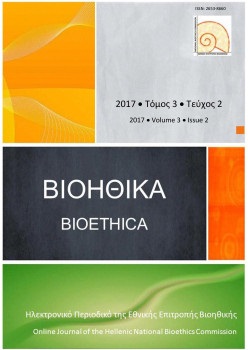Anthropological Research on the technique of egg donation in Greece: cultural conceptualizations, social practices, legislative provisions
Abstract
Legislative provisions regarding the use of reproductive technologies prove the attempt of law to respond to the new social needs and to supply answers to acute ethical and legal dilemmas which have arisen as a result of the dramatic progress of biotechnologies. Nevertheless, legislation must not appear as a simple list of rules. It reflects sociocultural conceptions and reconfigurations which characterize particular historical and political situations while at the same time affect and contribute to the shaping of the social agents choices.
I attempt to analyze this interaction between legislative provisions and social practices through the case of legislation of the egg donation technique. Drawing from the combination of the study of laws with the analysis of the anthropological research data -which reproduce the agents discourse- I try to show that legislation does not only defend but also reinforce the infertile couples attempt to normalize the oddity of medically assisted reproduction, to naturalize the birth of a child. The anonymity between all involved parties, the secrecy surrounding the whole process of the use of the egg donors and the construction of similarities between the child and the candidate parents not only meet the regulatory requirements of the legislative provisions but at the same time constitute strategies activated by the agents in order for the donor to be eliminated, the use of foreign eggs to be naturalized, the technique of assisted reproduction to imitate natural reproduction.
Article Details
- How to Cite
-
Τουντασάκη (Eirini Tountasaki) Ε. (2017). Anthropological Research on the technique of egg donation in Greece: cultural conceptualizations, social practices, legislative provisions. Bioethica, 3(2), 26–38. https://doi.org/10.12681/bioeth.19722
- Section
- Original Articles
Authors who publish with this journal agree to the following terms:
- Authors retain copyright and grant the journal right of first publication with the work simultaneously licensed under a Creative Commons Attribution CC BY 4.0 License, which allows for immediate free access to the work and permits any user to read, download, copy, distribute, print, search, or link to the full texts of articles, crawl them for indexing, pass them as data to software, or use them for any other lawful purpose. Appropriate credit must be given by citing the author(s) and the original publication in this journal.
- Authors are able to enter into separate, additional contractual arrangements for the non-exclusive distribution of the journal's published version of the work (e.g. post it to an institutional repository or publish it in a book), with an acknowledgement of its initial publication in this journal.
We encourage authors to deposit their articles, as well as data underlying the publications, in institutional and/or other appropriate subject repositories.
Bioethica permits and encourages authors to archive the final publication pdf in institutional (e.g. the repository of the National Hellenic Research Foundation) or other appropriate subject repositories (e.g. SSOAR repository for social sciences), in compliance with institutional and/or funder open access policies, after publication in the BIOETHICA. Authors must provide bibliographic details that credit publication in the journal, as well as related funding details (when applicable).
Lists of institutional and other subject-based academic open access repositories can be found listed by country at the registry http://opendoar.org/countrylist.php
If your institution does not possess a repository you may deposit a copy of your paper at no cost with www.zenodo.org , the repository supported for open access research in the EU by the European Commission, through the project OpenAIRE (www.openaire.eu )



